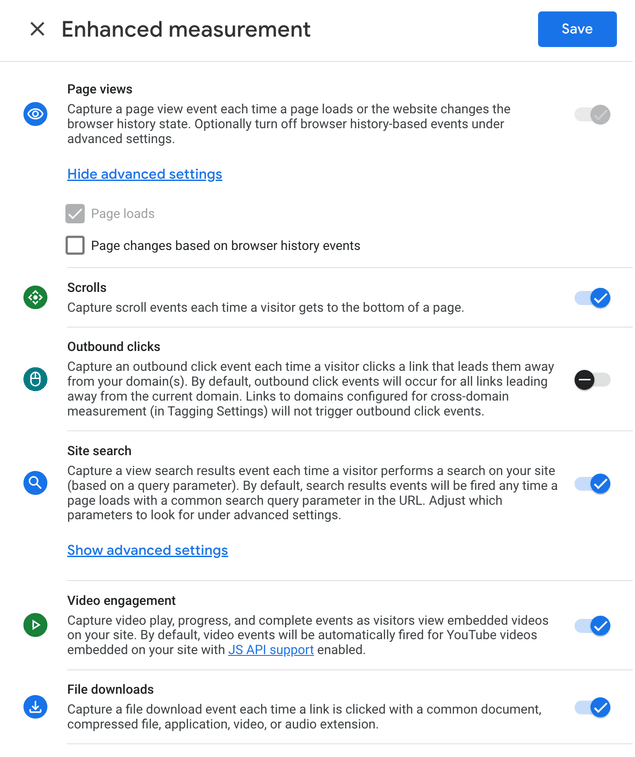Last updated
Enable analytics
This guide describes how to enable analytics in the Sharetribe Web Template
Table of Contents
The Sharetribe Web Template comes with built-in support for Google Analytics and supports tracking page views with a customizable analytics handler. The template also supports using Plausible analytics for tracking page views. This article explains how to enable Plausible or Google Analytics and use and create custom analytics handlers.
Configure Google Analytics
The template has built-in support for Google Analytics. All you need to
do is assign your Google Analytics Tracking ID to the environment
variable REACT_APP_GOOGLE_ANALYTICS_ID.
Information
Google Analytics doesn't work in a hot-loading environment! The
analytics script is added server-side. You can test it in your local
environment by using the command yarn run dev-server.
Google Analytics 4
Google recently released their new analytics service Google Analytics 4. Support for Google Universal Analytics will end on October 1, 2023. New versions of the template provide out-of-the-box support for Google Analytics 4.
If you prefer to use Universal Analytics, you should look into how Analytics was implemented in this pull request.
Information
The template will require a Tracking ID compatible with Google Analytics 4. The ID needs to begin with the "G-" prefix.
Enhanced measurements
It is not recommended to use the Enhanced Measurements feature introduced in Google Analytics 4, which is enabled by default. The Enhanced Measurements feature injects code into link tags which can break in-app navigation in the template. Therefore, we strongly recommend disabling the Enhanced Measurements feature when using Google Analytics 4 with the template.
If that's not an option, you can continue to use Enhanced Measurements if you disable the Outbound clicks and page changes based on browser history events features.
Built-in handlers
The Sharetribe Web Template includes an
event handler
that sends page_view events to Google Analytics. These events need to
registered manually because the template is a single-page application,
meaning that in-app navigation does not render a page load.
The Google Analytics script registers a page_view event automatically
on every page load. The
trackPageView
function takes this into account and only sends a page_view event to
Google if a page is accessed through in-app navigation.
If you'd like to track something other than page views, you can
implement your custom handler using the trackPageView function as an
example.
Configure Plausible Analytics
The template also includes built-in support for
Plausible Analytics. Plausible is a GDPR
compliant open source web analytics service. You must assign the
data-domain value from the Plausible Analytics tracking script to the
environment variable REACT_APP_PLAUSIBLE_DOMAINS.
If this would be your Plausible analytics script:
<script defer data-domain="example.com" src="https://plausible.io/js/script.js"></script>
You would assign example.com to the environment variable:
REACT_APP_PLAUSIBLE_DOMAINS=example.com
You can also assign multiple domains separated by a comma:
REACT_APP_PLAUSIBLE_DOMAINS=example1.com,example2.com
Without customising how Plausible is loaded into the template, you can only track page views using it.
Custom analytics libraries
If you choose to add another analytics provider (e.g. Facebook Pixel), you can follow these steps to import the third-party script and create a custom handler. In some cases, it might also be worth looking into npm packages instead of manually appending a third-party script.
Add the analytics library script
If the analytics library has an external script, you can add the library script tag to the src/util/includeScripts.js file. You will also need to whitelist the corresponding URLs in the server/csp.js file.
Create a handler
You can create a custom handler e.g. in
src/analytics/handlers.js.
If you want to track page views, you could create a class that
implements a trackPageView(canonicalPath, previousPath) method.
Note that the canonicalPath parameter passed to the function might not
be the same path as in the URL bar of the browser. It is the canonical
form of the URL.
For example: the listing page URL is constructed dynamically:
l/{listing-slug}/{listing-id}. The canonical form of that URL would
be: l/{listing-id}.
Information
A "slug" is a web development term for a short, user-friendly string. In the example above, the template generates the slug from the listing's title, which is prone to frequent changes. Therefore, a canonical form of that URL is needed to maintain a stable link which doesn't change every time the name of the listing changes.
This approach allows unified analytics and correct tracking of pages that can be accessed from multiple URLs.
If your analytics library tries to access the page URL directly through the browser, you might need to override that behavior to use the canonical URL that is given to the method.
Initialise the handler
Finally, you only need to initialise the handler in the
setupAnalyticsHandlers() function in
src/index.js.
